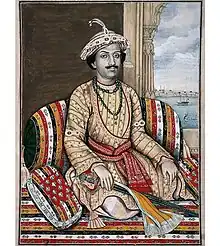
Maharaja Mahip Narayan Singh Saheb Bahadur succeeded the throne of Benares on 14 September 1781 . He became the ruler but under the terms of the company, which were that he should serve to dispense justice within his domains and make an annual contribution of 40 lakhs. He continued his family tradition of tussles with Britishers, who in turn labeled him incapable of governing because he refused to levy any taxes on farmers and thus refused to assist Britishers in draining wealth from India towards England,[1] therefore on 27 October 1794, under a formal agreement the four sarkars, or revenue districts, held by the Maharaja were transferred to the direct rule of the Company administration, leaving only the family domains under the rule of the Maharaja; in return Mahip Narayan Singh received 1 lakh per year in compensation and any surplus revenue of the sarkars.[2] Mahip Narayan Singh died barely a year later and was succeeded by his eldest son, Maharaja Sri Udit Narayan Singh Sahib Bahadur.[3]
References
- ↑ Bayly, C. A. (1988). Rulers, townsmen, and bazaars : north Indian society in the age of British expansion, 1770–1870 (1st pbk. ed.). Cambridge: Cambridge University Press. ISBN 0-521-31054-7. OCLC 20698220.
- ↑ Mukhopadhya, N (1872). Bharat Dharpan. Varanasi. pp. 60–75.
{{cite book}}: CS1 maint: location missing publisher (link) - ↑ Foreign and Political Department, India. (1892). A Collection of Treaties, Engagements, and Sanads Relating to India and Neighbouring Countries. Office of the Superintendent of Government Printing, India.